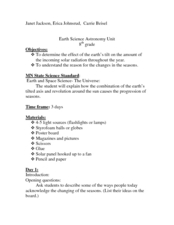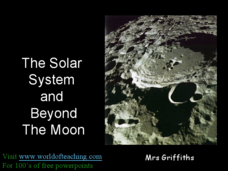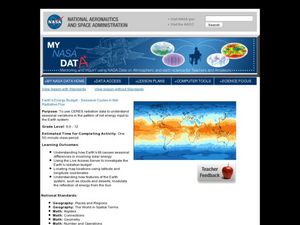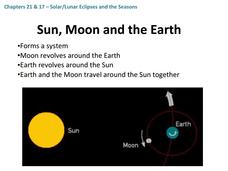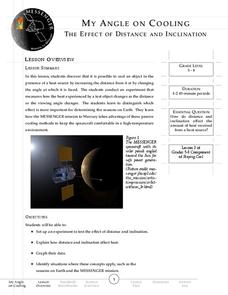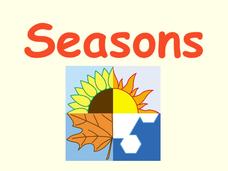Curated OER
Earth Science Astronomy Unit: Seasons on Earth
Eighth graders describe how the Earth's position causes seasonal changes. In this astronomy lesson, 8th graders explain how solar radiation varies depending on the season. They create a collage or poster on each of the Earth's four seasons.
Alabama Learning Exchange
The Sun and the Earth
Third graders study and diagram the positions of the Earth and sun during the four seasons. They predict weather for cities in the northern and southern hemispheres.
Curated OER
Reasons for the Seasons
This worksheet requires the pupils to follow a teacher activity, so more-than-the-usual preparation for a practical is needed. Looking at a globe as it rotates and receives "sunlight" from a flashlight, pupils are able to observe the...
Curated OER
The Solar System and Beyond: The Moon
Here is a very basic look at the moon and its positioning around our planet. The pictures and labels here show different phases and will help your space explorers understand our changing views of the moon along with the Earth's tilt and...
Mr. E. Science
The Earth in Space
Do you think Earth makes fun of other planets for having no life? The presentation covers the rotation and revolution of both the earth and our moon. It provides explanations for seasons, tides, and eclipses. Lesson is the 20th in a...
Curated OER
Reason for the Seasons
Young scientists examine why we have seasons on Earth, and how the motion of the Earth around the Sun causes them. Groups of learners are given a variety of balls, a bamboo stick, a marker, and a flashlight, then use the objects to...
Curated OER
Why Do We Have Seasons?
First graders watch a video about the seasons. They role play with the teacher the sun and earth. The student's heads are the earth, their foreheads are the Northern Hemisphere. The teacher shines a flashlight on them to simulate the sun...
Curated OER
Earth's Energy Budget - Seasonal Cycles in Net Radiative Flux
Learners attempt to understand seasonal variation by viewing images of the energy received by the earth. In this weather lesson, students view images from NASA of the influx of energy from the sun and make predictions about resulting...
Curated OER
Solar/Lunar Eclipses and the Seasons
How do the moon, sun, and Earth line up to create eclipses? Why do the seasons change throughout a year? The answers to these questions are explained through this series of slides. This apt presentation outlines information using bullet...
Space Awareness
Climate Zones
The climate at the equator is hotter than the climate at the poles, but why? The lesson goes in depth, explaining how the angles of illumination relate to the heating rate at different latitudes and seasons. Scholars use a strong lamp,...
Curated OER
What's Your Favorite Season?
Students explore earth science by creating illustrations in class. In this four seasons lesson, students identify the four different types of weather that take place during the year and read the books Harvest Year and Snow Comes to the...
Curated OER
Dry Season and 'Green' Season in Costa Rica
Students explore the seasonal changes in Costa Rica. In this dry season lesson students use the Internet to locate science data then generate data for precipitation.
Curated OER
Investigating Seasonal Variability in NO2 Concentrations
Young scholars study different formats of data and determine the nitrogen dioxide concentrations. In this seasons instructional activity students understand the different relationships that NO2 can have.
Messenger Education
My Angle on Cooling—Effect of Distance and Inclination
When exploring Mars, spacecrafts are exposed to 5-11 times more sunlight than when near Earth. Groups of pupils complete a hands-on activity to explore how distance and angle of the sun affect temperature. Through discussions, they then...
Curated OER
Hello, Sunshine!
Middle schoolers investigate how the sun travels across the sky at different latitudes using Solar Motion Demonstrator. In this earth science instructional activity, students explain why seasons change. They study how the tilt of the...
Curated OER
Introduction To Seasons
The purpose of this lesson is to introduce the students to a unit on seasons. The Students will learn how to navigate a PowerPoint presentation. They will use the PowerPoint presentation to take a pre test in order to determine the prior...
Curated OER
The Four Seasons - Earth's Axis
Students explain that it is the tilt of earth's axis that causes the seasons. They engage in a variety of activities, both teacher-led and on the computer, which enable them to further explain how the Earth's axis affects the seasons.
Curated OER
The Seasons
Discover the change of the seasons by modeling the Earth-Sun system. Learners model the orbit of the Earth around the sun and explore how and why the patterns of winter and summer occur.
Curated OER
Seasons Worksheet
Middle and high schoolers are given a diagram of the Earth rotating around the Sun. They label the seasons in the proper place, highlight special days such as the vernal equinox and autumnal equinox, the dates the special days fall on,...
Curated OER
Planet Earth
In this Earth worksheet, students review 13 terms associated with the Earth's rotation, revolution, and orbit. Students find the terms in a word search and then fill in the term next to its definition.
Curated OER
Seasons
Ask your class if they can determine which season is being represented by each of the four seasonal slides. Spring, summer, autumn, and winter are represented with typical holiday and weather images. Tip: Use actual images that show...
Curated OER
Sundials and Shadows - What Can They Teach Us About Seasons?
Students collect and analyze data relating to seasonal changes. They view a video, research web sites and build a sundial to collect their data.
Curated OER
Modeling the Seasons
Students explore the seasons and their attributes. In this geography lesson plan, students create a 3-D model of the Earth that showcases the elliptical travel of the Earth that causes seasons.
Curated OER
Seasons on Earth
Students examine how seasons occur and explore how the different angles effect surface heating. In this climate lesson students interpret satellite maps of the world that show seasonal differences in plant life.


